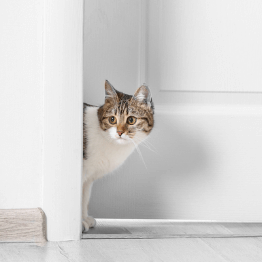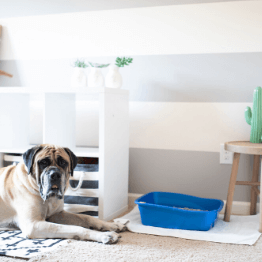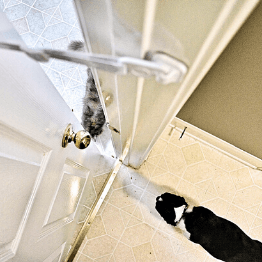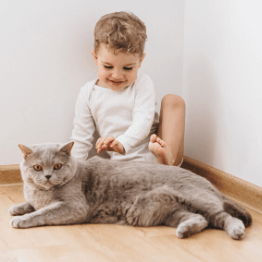HOW TO CARE FOR OLDER DOGS
WITH WAGWORTHY NATURALS
If you’re a dog owner, there comes a time when you’ll need to reassess your dog’s care needs as they enter their golden years. Once your pup reaches a senior dogs age, we pawrents need to make sure we’re taking the best care of them to keep our furbabies happy and healthy. With the right senior dog care, our canine companion can live to a ripe old age with us!
Caring for aging dogs requires a few changes, but nothing too major. Depending on your dog’s size and breed, they reach a senior dogs age at different stages. Once you know what this age is for your doggo, you’re ready to prepare for it. We recently chatted with Jane Bernard, founder of WagWorthy Naturals, who shared some great tips about improving your senior dog's quality of life.
In our Live Q&A Jane shed some light on what do senior dogs need, and how we can provide this for them. Dental care for senior dogs and supplements for joints are two aspects we cover. However, there is so much more to know. Keep reading for some pawsome tips!
SENIOR DOG AGES - HOW OLD IS A SENIOR DOG?
Turns out, those golden years are not a one-size-fits-all when it comes to our dog ages. Different sized dogs and different breeds are considered elderly at various ages. So, how old is a senior dog? Let’s take a closer look at the different dog ages and sizes:
- Small dog breeds are considered seniors at around 11-12 years old.
- Medium-size breeds are considered senior dogs at around 8-9 years old.
- Large breeds and giant breeds are considered seniors at around 6-7 years old.
“The rule of thumb, 7 to 9 years, does apply,” explains Jane, but you can get a much better idea of when your dog is considered senior if you consider the size and breed.
SENIOR DOG EXPERT, JANE’S 5 TIPS FOR CARING AN ELDERLY DOG
As pawrents, we know that our elderly dog will eventually grow old, and want our dogs to live as long as they possibly can! “As our dogs get to be seniors, there are some things that they require for support,” says Jane. What does an older dog need? From food for senior dogs to dental care for older dogs, there is lots we can to do keep our furbabies happy and healthy
We take a closer look at what these things are and how you can make senior dog care easier.
1. Don't Delay, Start Today
You don’t have to wait for your doggo to reach their grey-haired years before you start taking better care of your pet's health. As the saying goes, prevention is better than cure. Keeping your younger dogs healthy from day one will make any transitions to old age that much smoother.
Taking a note from an expert, Jane explains, the things you do today can mean an extra two, or even three years with your dog down the road. During the aging process, pay attention to their needs at that particular age, and offer as much support as you can. If you keep doing this as each year passes, you’re helping your doggo live its best life!
2. Switch to Food for Senior Dogs
Once your dog has reached the age where it would be considered an older dog, it’s time to look at switching to food for senior dogs. Why does this even make a difference? An older dog is at a higher risk of developing obesity because it no longer has the same energy levels as before.
Knowing what to feed your dog is an essential part of nailing those dog owner tips. As your pet ages, you’ll want to switch to food for senior dogs to prevent unnecessary weight gain. Having obese dogs does put them at a higher risk for numerous diseases that can be easily avoided.
With fewer treats and senior dog's diet, your doggo can stay fit and healthy for years to come. If you’re wondering whether or not your dog is at its ideal body weight, read this guide here. Knowing the warning signs of pet obesity can be a huge help!
Speaking of dog food, if you have a doggo that gets into the cat food, you’ll want to put a stop to this as soon as paw-sible. Cat food snacking can negatively impact your dog's body condition and it can signal a nutrient deficiency. Plus, have you ever heard of toxoplasmosis in pets? Yikes!
Without trying to find a dog proof cat feeder, Door Buddy can help keep your doggo out of the cat’s food. Our simple, adjustable pet door stap is the perfect solution for cat and dog households. Forget the dog proof cat feeder and pet gates and try our easy-to-install solution instead.
3. Consider Dental Care for Older Dogs
How much focus do you place on your dog's teeth? We’re guessing not much, and you’re not alone! Un-fur-tunately, this can be a major player in your dog’s life and health and needs rectifying ASAP.
Most doggos don’t get the right dental health care throughout their adult life, which is why you often see old dogs with a few missing teeth. Although those toothless grins can be endearing, it warrants greater concern. “Bad oral health can really degrade your dog’s health,’ says Jane.
So, this is your reminder to pay more attention to your pup’s pearly whites! A lack of dental care for an old dog (and most dogs) can lead to a number of health problems, including:
- Effect your dog’s immune system
- Increases the risk of dog heart disease
- Complicates diabetes in dogs
- Can cause your dog pain that you can’t detect
- Can lead to a broken jaw (especially in smaller breeds with disproportionately large teeth)
While there are some things you can do at home, regular veterinary care is a must! Although giving your dog dental treats and brushing their teeth if they allow you to, is a great start, the professionals will know what to look out for if there are any issues.
If you notice that your dog has bad breath or something wrong with their mouth, this is also a time to seek help from your vet.
4. Increase Your Vet Visits
Vets themselves say that when a dog reaches senior status, you should visit them once every six months if paw-sible.
When it comes to caring for senior dogs, regular vet care is one of the most important things you can do. As your dog gets older, their immune system often becomes weaker which puts them at risk of all sorts of ailments.
By visiting the vet every six months, early detection of any paw-blems is easier, which means a greater chance of a speedy recovery for your dog.
5. Encourage Regular Exercise & Try Supplements for Dogs Joints
“If you can keep your senior dog active, they’re going to live longer,” Jane emphasizes. Just because your dog is senior, they still need the mental engagement that comes with exercise to stay healthy and happy. You might need to enjoy shorter walks with your doggo, but sticking to those walks is key. If you maintain a healthy weight for your dog, exercising is easier. In the same breath, exercise and a healthy diet will help prevent weight gain.
A common issue many senior pet parents will know is joint deterioration and joint pain, which can lead to an arthritic dog. Degenerative joints are one of those things that come with age and it may slow your dog down. However, this doesn’t mean that you should necessarily avoid exercise entirely. Of course, a consultation with your vet is your best bet but you can try supplements for dogs joints too.
Jane recommends starting your pup on supplements for dogs joints and hips before they show signs of stiffness, arthritis, or other joint diseases because once a dog starts showing these symptoms, it means there is some inflammation happening. This inflammation is degrading to cartilage and joint tissue, and bone. By starting on supplements for dogs joints and hips sooner rather than later, you can delay major issues in your dog's senior years.
WagWorthy Naturals is your go-to when it comes to all your supplements for dogs joints and hips, and they have some truly pawsome products available. Don't wait for your old dog to develop arthritis. Start on those supplements and aim for good health today!
So, now that you know more about food for senior dogs and dental issues for old dogs, you’re on your way to helping your furbaby thrive as it ages! You’re ready to put your knowledge into action, and Jane shares some more expert advice and dog owner tricks here for you to watch.
Here’s to enjoying as much time as paw-sibble with our best friend and helping them lead their best lives as the natural process of aging occurs!








